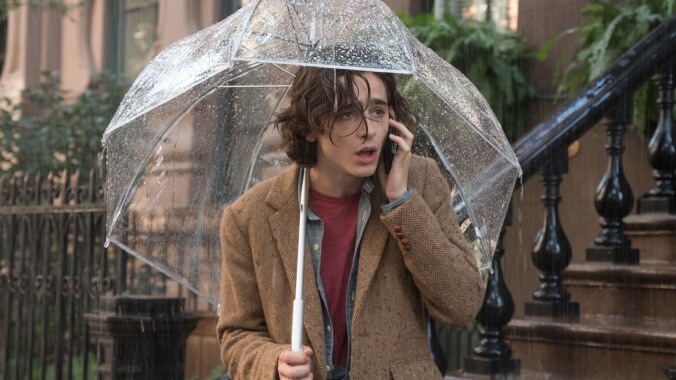Woody Allen’s worst creative impulses are on display in the long-delayed A Rainy Day In New York


Note: The writer of this review watched A Rainy Day In New York from home on a digital screener. Before making the decision to see it—or any other film—in a movie theater, please consider the health risks involved. Here’s an interview on the matter with scientific experts.
“What is the hell is it about older guys that seems so appealing to women?” muses the restless, quirky Gatsby Welles (Timothée Chalamet) as he strolls through Manhattan in a tweed jacket. The name alone is provocation, but the question posed seems calculated, in the parlance of our times, to trigger the increasing number of people who find the very concept of a Woody Allen movie objectionable. One’s reading of A Rainy Day In New York is not improved by a subsequent reference to the Gigi number “Thank Heaven For Little Girls.”
Nor does it help that Gatsby’s very excitable girlfriend, Ashleigh (Elle Fanning), spends the better part of the movie blushing at the attention lavished on her by an older, neurotic movie director and an older, neurotic screenwriter (different characters). If one were to come to the defense of A Rainy Day In New York, one might point out that this is actually a set-up for dramatic irony and the realization that these handsome, experienced men are even needier than their callow young counterparts. Thankfully, no mental gymnastics nor hedging of one’s bets on certain allegations is necessary: This is a bad movie, with maybe two good jokes and some of Allen’s clunkiest direction.
At least it has the good sense to make its characters fabulously rich, thereby avoiding the usual complaints about the director’s fanciful depictions of real estate. Gatsby (from a wealthy New York family) and Ashleigh (from a wealthy Arizona family) have taken a trip to Manhattan so that Ashleigh can interview her favorite director, Roland Pollard (Liev Schreiber), for their college newspaper and the two of them can enjoy a weekend spending some of the money that Gatsby recently won in a card game. These plans are thrown for a loop when Ashleigh ends up charming first the surly Pollard; then his nebbishy, cuckolded screenwriter, Ted Davidoff (Jude Law); then the movie star Francisco Vega (Diego Luna), who is Allen’s idea of a Latin lover.
Gatsby, in the meantime, has various misadventures, which including acting in a student film alongside his ex’s younger sister, Chan (Selena Gomez, doing her best Lauren Bacall), and hiring an escort to pose as Ashleigh at a soirée he was hoping to avoid, which eventually leads to one of the most blundering scenes in the Allen oeuvre. In the end, everybody learns a lesson about how life is too short (a sentiment that appears to be contradicted by the sheer number of movies Allen has made on this subject over the past 50 years). To say that A Rainy Day In New York feel antiquated would be understatement; its characters seem to live in a different era. But then again, the same is true of the work of such post-Allen eccentrics as Wes Anderson and Whit Stillman.
The real problem is it’s lazy and grating, and that, like a number of Allen’s worst comedies, it self-plagiarizes in ways that cast the vaunted early work in an unflattering light. Even if one has reached some upper level of enlightenment in matters of separating the art from the artist, the charges of creative bankruptcy are hard to ignore—among them the long-held suspicion that the only actor he’s ever really given direction to is himself. Multiple cast members are doing Woody Allen impressions of varying quality (sometimes in the same scene), and everyone else is spouting second-rate Allenisms.
The fact that Allen directs in extremely long takes sets him apart from anyone who’s making comedies right now; it’s one of the more teachable qualities of his style. But when ostensibly frothy banter falls flat, it’s hard to make the case that this is any better than the Apatow school of overlong, blenderized improv. Chalamet sounds like he’s reading his dialogue off a page; Fanning appears to be trying out for a pep squad. Some points should be awarded to Gomez and Schreiber, as the latter makes an effort to de-Allen-ize a very Allen-esque character saddled with a name whose auteur-referencing implications go beyond the mere cringe factor of “Gatsby Welles.”
The truth is that the lackadaisical qualities of A Rainy Day In New York are also present in many highly regarded Allen movies: the smug, cloying moral; the overstuffed cast of one-note characters; the over-reliance on cinematographers in all matters of style (here it’s Vittorio Storaro, whose romantic sheen might actually look good if he weren’t shooting digital); the apparently inexhaustible theme of why young women are attracted to balding, bespectacled, self-deprecating men.
Anyone who has seen a picture of Woody Allen will recognize the high levels of narcissism. But if one feels an attachment to particular Allen films, it is not necessarily a contradiction to criticize this stuff: The value we find in things is not an equation in which we subtract the sum of the off-putting qualities from the appealing ones and accept the result. Intentionally slight, A Rainy Day In New York speaks only to its director’s hackiest tendencies. It’s likely that the film (which was shot three years ago and has been disavowed by much of its cast) will be the last one Allen will film in the United States. If that’s true, it makes for an ignominious farewell.